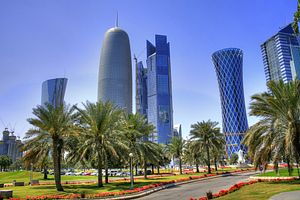China established a renminbi clearing center in Qatar in April. The center is the first in the Middle East to offer local financial institutions access to Chinese renminbi and foreign exchange markets. It also aims to facilitate greater cross-border use of the RMB and increase opportunities to expand trade investment between Beijing, Doha, and the wider region. The initiative is another step by the Chinese government towards its goal of becoming a major economic player in the region and beyond.
As its economic clout grows, especially in the wake of the global financial crisis, China has attempted to globalize the use of its currency so as to minimize reliance on the American dollar. For China, worldwide use of the renminbi would reduce the cost of financial transactions by permitting the direct exchange of RMB claims with non-USD currencies. It also raises demand for RMB-denominated assets globally, as financial institutions seek more RMB liquidity. At the same time, when more and more trade is dominated in RMB, it minimizes the need for China’s central bank to hold global reserves in American dollars.
Since it was inaugurated in 2008, the globalization of the RMB has made considerable progress. It is reported that the renminbi is now the world’s second most widely used currency. China has liberalized the offshore yuan market and enlarged offshore RMB centers around the world, including London, Taiwan, and Singapore.
Why Qatar?
It should come as no surprise that China elected to establish renminbi clearing center in Doha. Qatar is presently sitting on around $43 billion in net foreign currency reserves and approximately $200 billion in foreign assets in its sovereign wealth fund. In addition to its relative stability, Qatar is now the largest exporter of natural gas to China, meeting around 20 percent of Chinese energy demands.
More broadly, the Middle East is an important target for Chinese foreign policy. Last year, China the largest exporter to the region, accounting for more than fifteen percent of all goods exported to the Middle East. Chinese companies and investors are increasingly active in the region. As China’s economy grows, its economic foothold in the Middle East should only increase.
Simultaneously, there has been a noticeable shift in the world’s perception of Beijing’s currency. This shift comes amid fifty-fold growth in trade between China and the Middle East over the last two decades. Through currency swap agreements and RMB clearing center, China wants a growing share of that trade to be cleared in RMB. Ultimately, it hopes that oil and LNG exports can be priced in its own currency, minimizing trading time and transaction cost.
Establishing an onshore center providing access to RMB-based financial products and exchanges strengthens financial ties between Beijing and the Middle East and fosters the widespread use of the renminbi in the region, enabling China to do business with the region on its own terms.
This initiative is also inseparable from China’s recent efforts to revive the ancient Silk Road under the Silk Road Economic Belt. If it is to do that, Beijing cannot afford to ignore the Middle East, given the latter’s natural resources and strategic position. As such, the Silk Road initiatives require that China strengthen its presence in the Middle East.
Benefits for Doha
Qatar can also benefit from the internationalization of the RMB, strengthening links that already exist with China. This latest initiative will also bolster Doha as a regional and international financial center. Qatar has benefited from Asian economic growth; the clearing center will only strengthen that link. China itself is an emerging trading partner of Qatar, which makes it quite reasonable for the latter to diversify part of its large pool of foreign reserves away from American dollars. The center will also make new financial products, denominated in RMB, available to Qatari and Gulf investors.
Geopolitics
The establishment of the renminbi clearing center in Doha must also be viewed in a geopolitical context. It is another important step for China in creating a new multipolar international order, with an increasing concentration on Asia and international value chains emerging from the Silk Road Economic Belt. The internationalization of the RMB is an important element in the financial infrastructure for Asian capital markets. With the center initiative, Qatar and other countries in the Middle East are invited to participate in establishing the new global economic order and play their own role in the Silk Road initiatives.
Muhammad Zulfikar Rakhmat is a postgraduate student majoring International Politics at the University of Manchester.

































